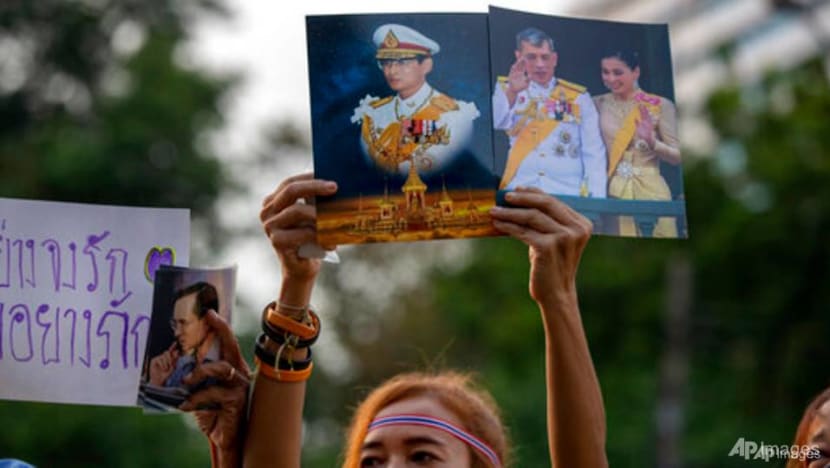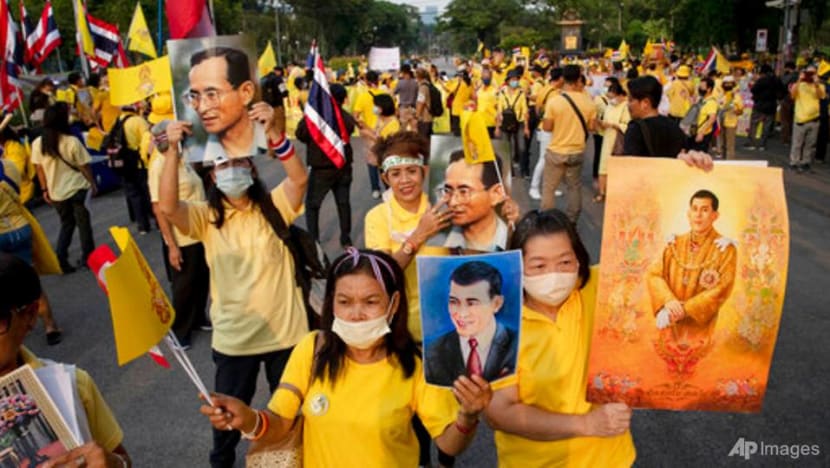Thailand's royal defamation law emerges as a hot-button election issue
The lese-majeste law stipulates that whoever defames, insults or threatens the king, the queen, the heir-apparent or the regent shall be punished with imprisonment of three to 15 years.

BANGKOK: Ahead of the general election this Sunday (May 14), a series of TikTok clips has been circulating in Thailand showing prime ministerial hopefuls in laid-back 30-second Q and A sessions.
Each of them had to answer similar questions, saying “yes” or “no” to various ideas that have been raised during the electoral campaign.
They ranged from legalising the sale of e-cigarettes to deregulating the local alcohol industry and decriminalising sex work.
But also, the candidates were asked about amending the strict royal defamation law – a sensitive topic that would not have been discussed in the open just a few years ago.
Some of the candidates answered yes while others said no. One hesitated and did not give a clear response.
“There are details. I can’t say ‘yes’ or ‘no’,” replied Paetongtarn Shinawatra, a prime ministerial candidate from the Pheu Thai Party.
The clips, which were published by local news outlet The Standard, garnered millions of views and many comments online.
Section 112 of the Thai Criminal Code – also known as the lese-majeste law – stipulates that whoever defames, insults or threatens the king, the queen, the heir-apparent or the regent shall be punished with imprisonment of three to fifteen years.
Its direct involvement with the monarchy and harsh prison sentence, which is equivalent to that of involuntary manslaughter, has made it a taboo topic in Thai society.
A statement or gesture related to the royal institution can turn into a serious criminal offence if it is deemed insulting or threatening to the monarchy.
For several Thais, questions about the royal defamation law can cause discomfort. Yet, with the election just a few days away, Section 112 has become a matter of interest and a hot topic in political debates.
Key political figures are often asked to share their views on the law and clarify if their parties would try to amend it in parliament after the election.
“Section 112 has already become a new political fault line in Thailand,” said Sunai Phasuk, a senior researcher on Thailand from Human Rights Watch.
He added that the law's frequent mentions on today’s political stage stemmed from calls for reform of the monarchy, which started during pro-democracy demonstrations three years ago.
Since 2020, Thailand has witnessed several rounds of street protests. They were led mainly by young Thais to voice their opposition against the government of Prime Minister Prayut Chan-o-cha and call for reforms, including that of the monarchy.
Demands included reducing the government budget for the monarchy to reflect the economic situation, and abolishing the royal defamation law to allow the public to express their opinions about the institution.
Related:
POLITICIANS DIVIDED ON LESE-MAJESTE LAW
Opinions on the lese-majeste law are divided among politicians along three main lines.
- Keep it as it is
Several prime ministerial candidates have expressed their support to preserve the status quo on Section 112. These include incumbent Prime Minister Prayut from the United Thai Nation Party, who made a reference to the lese-majeste law during his campaign rally in Krabi last weekend.
“Don’t meddle with the law so much. The law about ‘the above’, don’t meddle with it,” the retired general told his supporters.
Last month, another prime minister hopeful Anutin Charnvirakul also declared that his party Bhumjaithai will not work with anyone who wishes to amend Section 112.
“This is our only condition,” he said in a press conference on Apr 26.
- Amend it
Meanwhile, a few prime ministerial candidates have backed the amendment of the law. One of them is Pita Limjaroenrat from the Move Forward Party, who described Section 112 as “problematic”.
The progressive party has proposed several changes to the law, such as reducing the penalty and assigning the Royal Household Bureau as the sole entity to press charges.
At present, lese-majeste is an offence related to national security and complaints can be made by anyone.
“We don’t want Section 112 to be used as a weapon against people with different views, or a weapon to destroy the country’s future or people who say the feelings of the era are no longer the same,” said Pita in a political debate on Apr 25.
Also pushing for legal changes is Warong Dechgitvigrom from the royalist party Thai Pakdee. But unlike the Move Forward Party, his party has been campaigning for increased protection of the monarchy.
He claimed there is a movement that aims to destroy the institution and that the law should also protect more members of the royal family as well as the former monarchs of the Chakri dynasty, which reigns over Thailand today.
“I’d like to affirm that this law does not affect the development of the country, and that it’s not a problem for the people,” said Warong in a political debate last month.
- Abolish it
The abolishment of the lese-majeste law is one of the key policies of the Commoners’ Party. Its parliamentary candidate Kornkanok Khumta mentioned in a political debate in April that Section 112 has become a weapon to “silence the ordinary people”.
“Many people, including some here today, were jailed for simply expressing their opinions without hurting anyone,” she said.
Based on data from Thai Lawyers for Human Rights (TLHR), at least 1,902 people have been prosecuted for taking part in demonstrations and expressing political opinions between July 2020 and April 2023. Of these, 242 were accused of lese-majeste, including 18 individuals aged below 18.
Their alleged crimes varied from expressing opinions on Facebook about a former king’s death, to holding up a three-finger salute in the Royal Plaza as a sign of defiance.
POLITICIANS’ STANCE ON LESE-MAJESTE COULD SWAY VOTES
Sunai from Human Rights Watch believes that the youth protests and their call to reform the monarchy remain relevant as issues to the electorate to this day.
“This is proof that three years later, with the election about to take place, this topic still remains on many people’s minds and it’s still considered an important issue,” Sunai told CNA.
“It also shows that sentiments of people in society are clearly divided into two sides now: The side that wants to maintain the status quo, the monarchy, and the side that wants to see reform,” he added.
According to Sunai, parties on both sides of this new political fault line have benefited from their candidates’ views on the matter.
“The conservative wing has gained support from people who want to preserve the status quo. We’ve seen political campaigns against talks about Section 112, and this showed that the issue has become a selling point for the conservative too,” he said.

However, more talks about the lese-majeste law ahead of the election do not necessarily translate into a significant change in parliament afterwards.
Political scientist Pitch Pongsawat from Chulalongkorn University said Thailand’s parliamentary politics has yet to prove it can resolve this matter successfully, despite attempts by lawmakers to amend the law in the past.
“Attempts to amend the law were always brushed off, even though a lot of people were talking about it,” he told CNA.
“The issue may have been mentioned in political debates, but frankly speaking, this election isn’t about changing the system or reform the monarchy. This election has other meanings.”
In 2021, the Move Forward Party submitted a proposal to amend Section 112 to parliament. However, it was seen as a violation of the Constitution and dismissed.
For Pitch, the lese-majeste law is not a major issue in the upcoming election, and opinions of politicians on the matter do not always define the parties’ political stands.
“Thai politics isn’t that critical right now,” he said.
“We’re rather looking at democracy and whether or not it will win the electoral game, or whether the regime will be able to maintain its power after its poor performances on the economic front as well as in the COVID-19 crisis.”

















